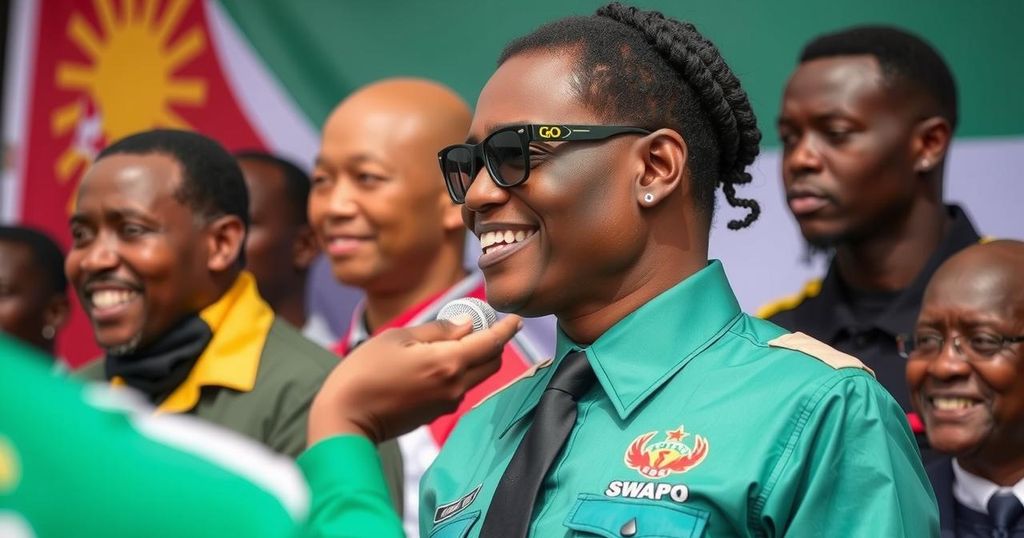World news
AFRICA, ALLIANCE DU CHANGEMENT, ALLIANCE LEPEP, BDP, BOTSWANA DEMOCRATIC PARTY, DEMOCRACY, ELECTIONS, GOVERNANCE, GOVERNMENT, MAURITIUS, MILITANT SOCIALIST MOVEMENT, NAMIBIA, NET, NETUMBO NANDI - NDAITWAH, OPPOSITION, PARLIAMENTARY SEATS, PR, PRAVIND JAGNAUTH, SAHARAN AFRICA, SWAPO
Jamal Robinson
0 Comments
Namibia Elections: Swapo Faces Electoral Setbacks Amid Regional Trends of Opposition Gains
Namibia’s Swapo party retained power but suffered significant electoral losses, reflecting a regional trend where incumbent governments face declining support due to economic challenges and corruption. This year has seen several long-standing parties in sub-Saharan Africa lose seats or power, with a growing assertiveness from opposition groups indicating increased political engagement among citizens.
Namibia’s ruling party, the South West Africa People’s Organization (Swapo), successfully retained power during the recent elections, marking its continued dominance for over three decades. However, the election results revealed a troubling trend, with Swapo securing only 57% of the presidential vote, despite suffering significant losses in parliamentary seats. The party has faced widespread criticism from opposition groups who claim the election was marred by logistical issues and irregularities.
The current political climate in sub-Saharan Africa is characterized by a wave of electoral setbacks for incumbent governments, known for their historical grip on power. In 2024, this trend was underscored by substantial defeats for ruling parties in various countries, indicating a growing dissatisfaction among voters driven largely by economic concerns and corruption. Following an impressive mobilization of opposition forces, several governing parties have faced unprecedented challenges at the polls, as evidenced by the dramatic changes in political power seen in Botswana and Mauritius.
In Botswana, the ruling Botswana Democratic Party was nearly eliminated from parliament, winning only four seats in stark contrast to its previous majority. Similarly, in Mauritius, the ruling Alliance Lepep coalition suffered a rout, capturing only two seats as the Alliance du Changement overwhelmingly won 60 out of 66 parliament seats. Igor as major political shifts occurred, other nations such as Senegal and Somaliland also experienced significant opposition victories. In Senegal, the release of opposition leaders led to a stunning electoral turnaround, with the opposition winning decisively against the government’s candidate.
Despite not losing outright, some ruling parties, such as South Africa’s African National Congress, faced significant blowbacks, recording their lowest vote share in decades and necessitating coalition partnerships. This suggests a culture where electorates are increasingly no longer willing to accept governance poorly handling economic challenges, corruption, and civil liberties. Growing concerns about inflation and living costs have triggered citizen unrest that mirrors global trends, as seen in countries like the UK and the US.
This year has highlighted increased political competition in Africa, revealing a resilient democratic spirit among the populace. Opposition parties have modernized strategies and strengthened coalitions, effectively challenging long-standing regimes. As 2024 unfolds, the countries that have seen significant governance transitions set a potential precedent for upcoming elections in Ghana and Malawi, where similar discontent may result in political transformation.
This trend of upheaval suggests a deeper, underlying resilience within African societies toward promoting democracy and accountability in governance. As such, international observers and advocates for democracy must recognize sub-Saharan Africa’s developing multiparty political landscape, which appears to challenge the broader narrative of democratic decline globally.
Nic Cheeseman, a prominent academic in the field of political science, has pointed out that Africa’s struggle for democracy showcases admirable civic engagement and a commitment to holding leaders accountable. This ongoing political evolution underscores the changing dynamics in global governance, where African nations are increasingly impactful players in the transition toward democratic consolidation.
The recent elections in Namibia are part of a broader trend in sub-Saharan Africa, where ruling parties are facing growing opposition and voter disillusionment. Economic downturns, corruption, and demands for accountable governance have heightened public dissatisfaction. This year has marked a significant shift in the political landscape, with several long-standing governments losing substantial support or power in various elections across the region, suggesting a notable resilience among the electorate and the emergence of more robust opposition movements.
In conclusion, the recent Namibian elections reflect a crucial shift in the political landscape of sub-Saharan Africa, with increasing voter rejection of established incumbents. The events signify not merely electoral losses but a growing demand for accountability and reform, driven by widespread economic dissatisfaction and civic engagement. As opposition parties unite and mobilize effectively, the resilience and aspirations of African citizens towards democracy and effective governance become increasingly evident.
Original Source: www.bbc.com




Post Comment